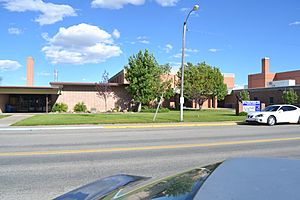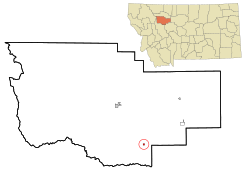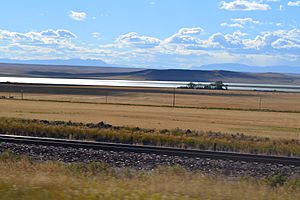Fairfield, Montana facts for kids
Quick facts for kids
Fairfield, Montana
|
|
|---|---|

Fairfield High School
|
|
| Nickname(s):
Malting Barley Capital of the World
|
|

Location of Fairfield, Montana
|
|
| Country | United States |
| State | Montana |
| County | Teton |
| Area | |
| • Total | 0.31 sq mi (0.81 km2) |
| • Land | 0.31 sq mi (0.81 km2) |
| • Water | 0.00 sq mi (0.00 km2) |
| Elevation | 3,983 ft (1,214 m) |
| Population
(2020)
|
|
| • Total | 759 |
| • Density | 2,417.20/sq mi (934.47/km2) |
| Time zone | UTC-7 (Mountain (MST)) |
| • Summer (DST) | UTC-6 (MDT) |
| ZIP code |
59436
|
| Area code(s) | 406 |
| FIPS code | 30-25225 |
| GNIS feature ID | 2412613 |
Fairfield is a small town in Teton County, Montana, United States. In 2020, about 759 people lived there. Fairfield is known as the "Malting Barley Capital of the World." This is because they grow a lot of malt barley every year.
Fairfield is an important place for local farmers to trade their goods. Some companies in Fairfield include Busch Agricultural Resources, 3 Rivers Telephone Cooperative, and Sun River Electric Cooperative.
Contents
History of Fairfield
Fairfield started as a stop along the Milwaukee Railroad. This was a long time ago.
The U.S. government allowed people to claim land in Montana for farming in 1862. This was part of the Homestead Acts. However, the Fairfield area was very dry. It needed water to grow crops.
So, in 1902, people began building irrigation systems. These systems brought water to the dry land. This helped farmers grow much more grain. In 1903, the Bureau of Reclamation studied the area. They thought the Sun River Valley had great potential for farming.
In 1909, the amount of land a homesteader could claim increased. This change brought many more settlers to Montana. By 1920, three dams and many canals were built. The Gibson Dam and its reservoir were finished in 1929. Today, the Greenfield Irrigation District uses water from Gibson Dam. It helps water about 83,000 acres of farmland around Fairfield.
The area was first called "Freeze-out Bench." This name showed how cold and dry it was. But with irrigation, the land became very fertile. Now, "Greenfield Bench" and Fairfield describe the rich hay and grain fields in the Sun River Valley.
Geography of Fairfield
Fairfield is located between the cities of Great Falls and Choteau. It is right on Highway 89.
About 5 miles west of Fairfield is Freezout Lake. This lake is a very important place for many birds. They stop there during their long migrations.
According to the United States Census Bureau, the town covers about 0.31 square miles (0.81 square kilometers). All of this area is land.
Fairfield's Climate
Fairfield has a semi-arid climate. This means it is generally dry, but not a desert. It gets some rain, but not a lot.
Fairfield holds a record for a big temperature change. On December 14, 1924, the temperature dropped from 63 degrees Fahrenheit at noon to minus 21 degrees Fahrenheit at midnight. That's a huge drop in just 12 hours!
| Climate data for Fairfield, Montana (1991–2020 normals, extremes 1927–present) | |||||||||||||
|---|---|---|---|---|---|---|---|---|---|---|---|---|---|
| Month | Jan | Feb | Mar | Apr | May | Jun | Jul | Aug | Sep | Oct | Nov | Dec | Year |
| Record high °F (°C) | 65 (18) |
74 (23) |
76 (24) |
85 (29) |
91 (33) |
97 (36) |
101 (38) |
103 (39) |
97 (36) |
89 (32) |
73 (23) |
68 (20) |
103 (39) |
| Mean maximum °F (°C) | 56.1 (13.4) |
56.6 (13.7) |
64.9 (18.3) |
73.8 (23.2) |
80.9 (27.2) |
86.0 (30.0) |
92.9 (33.8) |
92.6 (33.7) |
87.5 (30.8) |
77.6 (25.3) |
63.3 (17.4) |
54.7 (12.6) |
94.6 (34.8) |
| Mean daily maximum °F (°C) | 35.7 (2.1) |
36.4 (2.4) |
44.8 (7.1) |
52.8 (11.6) |
62.3 (16.8) |
69.5 (20.8) |
79.7 (26.5) |
79.0 (26.1) |
68.5 (20.3) |
55.3 (12.9) |
42.7 (5.9) |
35.3 (1.8) |
55.2 (12.9) |
| Daily mean °F (°C) | 26.1 (−3.3) |
26.8 (−2.9) |
34.3 (1.3) |
42.2 (5.7) |
51.5 (10.8) |
58.5 (14.7) |
66.5 (19.2) |
65.5 (18.6) |
56.3 (13.5) |
44.6 (7.0) |
33.8 (1.0) |
26.6 (−3.0) |
44.4 (6.9) |
| Mean daily minimum °F (°C) | 16.5 (−8.6) |
17.1 (−8.3) |
23.9 (−4.5) |
31.5 (−0.3) |
40.7 (4.8) |
47.6 (8.7) |
53.3 (11.8) |
51.9 (11.1) |
44.0 (6.7) |
33.9 (1.1) |
24.9 (−3.9) |
17.9 (−7.8) |
33.6 (0.9) |
| Mean minimum °F (°C) | −9.7 (−23.2) |
−5.3 (−20.7) |
0.0 (−17.8) |
15.5 (−9.2) |
28.6 (−1.9) |
36.5 (2.5) |
43.3 (6.3) |
41.7 (5.4) |
29.9 (−1.2) |
14.2 (−9.9) |
0.7 (−17.4) |
−6.0 (−21.1) |
−20.0 (−28.9) |
| Record low °F (°C) | −38 (−39) |
−44 (−42) |
−32 (−36) |
−12 (−24) |
11 (−12) |
28 (−2) |
35 (2) |
31 (−1) |
13 (−11) |
−9 (−23) |
−28 (−33) |
−44 (−42) |
−44 (−42) |
| Average precipitation inches (mm) | 0.34 (8.6) |
0.43 (11) |
0.60 (15) |
1.36 (35) |
2.12 (54) |
2.63 (67) |
1.08 (27) |
1.05 (27) |
1.23 (31) |
0.74 (19) |
0.46 (12) |
0.33 (8.4) |
12.37 (314) |
| Average precipitation days (≥ 0.01 in) | 4.4 | 4.9 | 5.6 | 7.1 | 8.0 | 9.4 | 5.8 | 5.7 | 5.5 | 4.3 | 4.2 | 4.1 | 69.0 |
| Source: NOAA | |||||||||||||
Population of Fairfield
| Historical population | |||
|---|---|---|---|
| Census | Pop. | %± | |
| 1950 | 693 | — | |
| 1960 | 752 | 8.5% | |
| 1970 | 638 | −15.2% | |
| 1980 | 650 | 1.9% | |
| 1990 | 660 | 1.5% | |
| 2000 | 659 | −0.2% | |
| 2010 | 708 | 7.4% | |
| 2020 | 759 | 7.2% | |
| U.S. Decennial Census | |||
In 2010, there were 708 people living in Fairfield. These people lived in 305 households. Most of the people (95.9%) were White. About 1.3% were Native American. And 2.8% were from two or more racial backgrounds. A small number (1.4%) were Hispanic or Latino.
The average age of people in Fairfield in 2010 was 42.1 years old. About 27% of the people were under 18 years old. And 21.2% were 65 years old or older.
Education in Fairfield
Fairfield has public schools for students from kindergarten all the way through 12th grade.
Fairfield Public Schools
In 2019, Fairfield Elementary School received a special award. It was one of only three schools in Montana chosen for the National Blue Ribbon Schools Program award. This award recognizes schools that are excellent.
The high school girls' basketball team is very famous. From 2010 to 2015, they won 120 games in a row! This is one of the longest winning streaks for a high school girls' basketball team in the United States. The Fairfield High School team is called the Eagles.
Private Schools
Fairfield also has a private school. This school is for children from the Mennonite community.
Fairfield Public Library
The town has a public library. It is run together by the city and the county.
Media in Fairfield
Fairfield has its own weekly newspaper. It is called the Fairfield Sun Times. This newspaper has been around since the town first started.
There is also a radio station in Fairfield. Its call sign is KINX.
Notable Person from Fairfield
- Gordon McOmber was the Lieutenant Governor of Montana from 1988 to 1989. The Lieutenant Governor is a high-ranking official in the state government.
Local Holidays in Fairfield
- Swim Day: This holiday started in 1932. It happens on the third Saturday in July each year.
See also
 In Spanish: Fairfield (Montana) para niños
In Spanish: Fairfield (Montana) para niños
 | Lonnie Johnson |
 | Granville Woods |
 | Lewis Howard Latimer |
 | James West |


